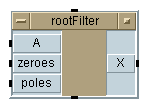

Implements an analog filter with transfer response specified by poles and zeroes.


Analog filters are generally specified by a rational polynomial. Use this filter when you know the roots (zeroes and poles) of the defining polynomial.
menu: veeos ==> Signal Processing ==> Modules ==> rootFilter
library: sigLib
see example in veeos menu
In general a linear (analog) filter may be defined by the rational polynomial
H(S) where Output(S)=Input(S)*H(S). A typical H(S) rational polynomial may be
expressed as:
( (S-z[0])*(S-z[1])*...(S-z[i]) ) / ( (S-p[0])*(S-p[1])*...(S-p[i])
)
where z and p are the roots of the numerator and denominator polynomials. This function inputs those two vectors, determines H(jF), and filters the input signal appropriately.
If you have a zeroes at infinity then the numerator will be just a constant. In this case you may be better off using polyFilter. However, perhaps you really do want to work with the poles separately, in which case you can still proceed by noting that the polynomial has factors of the form (S-z[0]) and that you are free to specify anything you like for z[0]. In this case you can, for instance, choose z[0] = "S-67" so that S-z[0] becomes S-S+67 or just 67.
VEE 7.0+, all platforms
aFilter, AnalogFilter, funcFilter, rootFilter